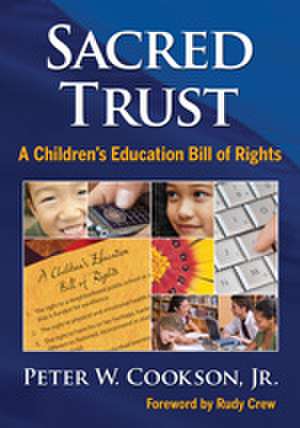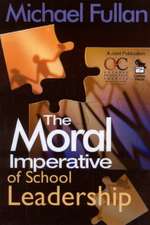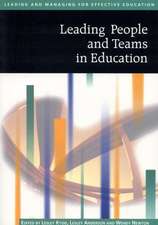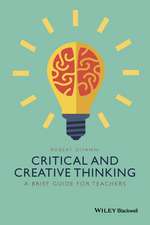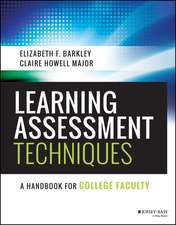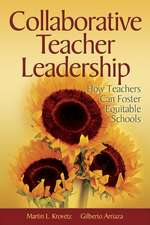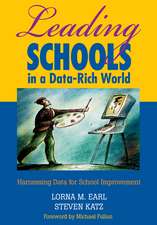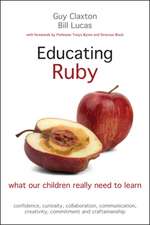Sacred Trust: A Children’s Education Bill of Rights
Autor Peter W. Cooksonen Limba Engleză Paperback – 5 iul 2011
Preț: 279.56 lei
Nou
53.50€ • 55.54$ • 44.61£
Carte tipărită la comandă
Livrare economică 25 martie-08 aprilie
Specificații
ISBN-10: 1412981166
Pagini: 160
Dimensiuni: 178 x 254 x 10 mm
Greutate: 0.34 kg
Ediția:1
Editura: SAGE Publications
Colecția Corwin
Locul publicării:Thousand Oaks, United States
Recenzii
"This book will be very helpful for future K–12 administrators as they attempt to understand the underlying dynamics of future trends and educational demands. It provides educators with a solid philosophy and personal plan of action for addressing these issues in their own community."
"This book approaches the problems of education in a positive way by relating how to solve those problems through the consideration of the rights of children. The author’s list of rights is refreshing and different from other lists that have been published. I wholeheartedly recommend this book for all educators and anyone who has a stake in education."
"In Sacred Trust: A Children’s Education Bill of Rights, Peter Cookson provides a road map for developing every child’s greatest abilities and private hopes and dreams. With his proposed ten rights, plus the added right to good government, he provides a compact that if fulfilled will save our species from self-inflicted extinction. All educators, policy makers, and parents should treasure this book for its robust guidance on how we can benefit everyone by achieving this essential Bill of Rights."
"Peter Cookson elegantly parses language in a manner which speaks convincingly to the heart of an idealist and the mind of a pragmatist. His passionate and urgent plea for a 'Children's Education Bill of Rights' provides a reform blueprint with, through and for schoolchildren and youth in our country. This book is must reading for all interested in empowering more citizens to gain the promise of America."
"This book is both succinct and comprehensive, well-documented and objective, but full of a pregnant sense of outrage, powerful and commanding. The message is that it is time to stop talking and start solving our education problem."
"Brimming with ideas, inspiration, and important questions, Sacred Trust could be the cornerstone for ongoing debate and action aimed at creating the schools we need for children in this century. Peter Cookson is an eloquent writer whose educational insight and wisdom warrants close attention."
“Sacred Trust bristles with passion and imagination. Peter Cookson makes a forceful argument that the human rights of life, liberty and the pursuit of happiness articulated in the Declaration of Independence demand an education which cultivates the whole person."
"Outlines the types of education all American kids should have a right to enjoy and covers problems and solutions to achieving this uniform goals. Makes a fine action plan for all schools to consider."
Cuprins
Acknowledgements
About the Author
Introduction: A Measure of Our Soul
Chapter One: The Power of People and the Purpose of Public Education
All Children Dream
Educationally Experimenting on the Poor
Madison was Right: A New Policy Framework
Turning Dreams into Reality
The Obtainable Utopia
Book Study Questions
Possible Action Steps
Suggested Further Reading
Chapter Two: The Right to a Safe, Healthy, World-Class Pubic School
Right Number 1: The right to a neighborhood public school or a public school of choice that is funded for excellence
The Great Unequalizer
Getting to the Real Issues
Money---Spent Wisely---Does Matter
Reclaiming Horace's Dream
Book Study Questions
Possible Action Steps
Suggested Further Reading
Right Number 2: The right to physical and emotional health and safety
Do No Harm: The First Obligation
Basic Justice Requires Basic Care
Health and Social Health
Book Study Questions
Possible Action Steps
Suggested Readings
Chapter Three: The Cultural and Individual Rights of Students
Right Number 3: The right to have his or her heritage, background, and religious differences honored, incorporated in study, and celebrated in the culture of the school
Unity Within Diversity
The Open Mind and the Open Society
The Empathic Civilization
The Classroom Is the World
Book Study Questions
Possible Action Steps
Suggested Further Reading
Right Number 4: The right to develop learning styles and strategies to the greatest extent possible
Doubt and Its Virtues
The Mismatch Between Research and Practice
Maximizing Children's Talent Through Individualization
Inquiry as a Way of Life
Book Study Questions
Possible Action Steps
Suggested Further Reading
Chapter Four: The Right to High Quality Instruction and School Leadership
Right Number 5: The right to an excellent and dedicated teacher
Why Don't We Ask the Teachers?
Elevating Teaching
Practical Idealism Works
Book Study Questions
Possible Action Steps
Suggested Further Reading
Right Number 6: The right to a school leader with vision and educational expertise
Leadership for 21st-Century Schools
National Educational Leadership
A School Without Vision Is Lost
Book Study Questions
Possible Action Steps
Suggested Further Reading
Chapter Five: The Right to World-Class 21st-Century Curriculum and Technology
Right Number 7: The right to a curriculum based on relevance, depth, and flexibility
Boredom--The Lucky Two Percent
Virtual Socrates
Eradicating Boredom
Book Study Questions
Possible Action Steps
Suggested Further Reading
Right Number 8: The right of access to the most powerful educational technologies
Learning in the Electronic Era
Why a Right to 21st-Century Communication Technologies?
Technology, Technopoly, and Cyber Sanity
What Would Socrates Say?
Book Study Questions
Possible Action Steps
Suggested Further Reading
Chapter Six: The Right to Equality of Educational Opportunity
Right Number 9: The right to fair, relevant, and learner-based evaluations
In the Belly of the Beast
Why a Right to Fair Evaluation?
The Einstein Factor, the Picasso Possibility, and the Sanctity of Natural Genius
Book Study Questions
Possible Action Steps
Suggested Further Reading
Right Number 10: The right to complete high school
The Tragic Consequences of Educational Neglect
Why a Right to Graduate?
What Would the Founders Say?
Book Study Questions
Possible Action Steps
Suggested Further Reading
Chapter Seven: The Right to Good Government
21st-Century Government and a "Sense of the People"
A New Department of Education---A National "Seminary of Learning"
Organizing for Learning
The Dream Recaptured
Book Study Questions
Possible Action Steps
Suggested Further Reading
Resource 1: The Historic Issue of Equity and Excellence
Resource 2: The Virginia Declaration of Rights
Resource 3: Education and the Peace Dividend
Resource 4: Principles of Multicultural Education
References
Index
Notă biografică
Peter W. Cookson, Jr. is the founder of Ideas without Borders, a Washington DC-based educational consulting firm focusing on human rights and 21st century learning. A sociologist of education he has taught and held leadership positions at several leading colleges and universities including Teachers College, Columbia University.
After working as a case worker in New York City, Cookson started his teaching career as a fifth grade social studies and English teacher in rural New England. He writes extensively on the topics of equality of educational opportunity, 21st century learning, and school choice. Some of his works include School Choice: The Struggle for the Soul of American Education (Yale University Press), Expect Miracles: Charter Schools and the Politics of Hope and Despair (Westview Press) and What Would Socrates Say? in Educational Leadership.
He holds a doctorate in the sociology of education from New York University and a master¿s degree from Yale Divinity School, where he held the Katsuso Miho Scholarship in Peacemaking.
